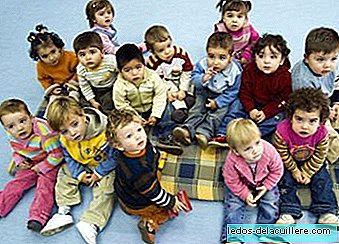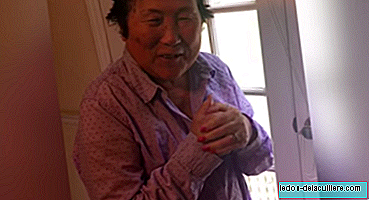The upbringing of our days is quite different from that of thirty or forty years ago, and it is not just a matter of security. At present, parents tend to worry about more and we are excessively aware of our children, reaching the point of overprotect them so much They practically do not know how to do anything for themselves.
As parents, we do our best for the welfare of our children, and we believe, erroneously, that being always on top of them is for their sake. But on the contrary, we do not allow them to learn from their mistakes and therefore, we do not allow them to grow.
Hyperpadres and Hypochildren
The phenomenon of hyper parents or hyperpaternity It is a parenting style that takes the reins of all aspects of the child's life and interferes with the development of their own autonomy, creating "hypo-children."
There are two types of parents that we might consider hyper parents, "helicopter parents", who spend all the time flying over the children, always ready to help or protect, and "lawn mower parents" They go ahead of their children, paving the way for them and making sure nothing gets in their way.
Both types of parents use similar tactics, usually anticipating problems and suffering, and when they arise reacting for them, leaving no room for the children themselves to face them.

Go ahead and give them everything done
Parents who ask for their homework on WhatsApp (and sometimes they even do it), parents who carry the school bag, who comb them until they are 15, and always control the location via mobile. Being event planners, filling the agenda of activities and meddling excessively in the school environment of the children are some of the usual behaviors of hyper parents.
They are attitudes that contribute to doing increasingly dependent and insecure children, used to dad and mom do everything for them. Being children, the effects are not so noticeable, but when they get older they become adolescents and adults without autonomy No ability to make their own decisions.
From "movable children" to "altar children"

Eva Millet, a journalist specializing in education and parenting and author of 'Hyperpaternity' and 'Hiperniños' delves into her books on the consequences of overprotection, and explains:
"We have gone from having movable children, to whom we paid little attention, to having altar children, to whom we venerate."
He points out that children become a parent project, a product to manage. Mothers who practice a intensive motherhood, who celebrate in extreme each achievement of their children, and obsessed with their children being successful. This way they fill up their extracurricular agendas, leaving them barely free time for leisure or for family time.
We are in a constant race to be perfect parents and have perfect children "but the children do not want perfect parents: they want to be loved, set limits, and trust them," says Eva, who invites us through her works to live a more serene and relaxed parenthood.
How to avoid falling into hyperpaternity
Obviously, we do it without being aware that we are harming them, but our protection doesn't do them any good. What behaviors can we start to change to avoid falling into hyperpaternity?

Let them be wrong
Doing everything possible to avoid failure for our children is counterproductive. It’s important to let them get it wrong because they will learn from their mistakes and they will strive to try again.
People who do not face their failures tend to make excuses for their mistakes, without striving to improve. If we overprotect them from failure now that they are small we will end up getting the opposite effect: an attitude of no effort that in the future will lead them directly to failure.
To make them see that things do not always come out at the first and much less as we would like them to come out, it is a positive learning for the rest of their lives.
Promote their autonomy from an early age
Autonomy gives children self-confidence. If we do everything for them (we dress them, we button them up, we cut their food, etc.), how are they going to learn to do it? If we give it all done, they will be unable to function on their own.
Educating in autonomy since they are young will make them acquire greater confidence in themselves and their own abilities, making them more confident people.
We must establish limits that give them security and assign them small responsibilities according to their age, according to their stage of development, which will help them grow as autonomous persons.
Accompany them without doing for them
All this does not mean abandoning them to their fate and "having them alone." We must let them know at all times that we are with them to accompany and support them until they learn and see that they are able to do it themselves.
We are the most important for our children, their guide and the pillar on which to rely. Offer security by accompanying him when he asks for it or go to ask for advice or help, but let it unfold alone.
Let them make their own decisions
Like the previous point, if we make decisions for them all my life, when they have to make their own decisions they will feel lost. That is why it is essential to educate children from a young age not to obey us, but to learn to make good decisions.
It is a long and daily process that is built day after day. Little by little, we must begin to give them the opportunity to decide for themselves, according to the maturity of each child. We must allow them to choose by making them feel that their opinions are worth and allowing them to be wrong. As we said before, making mistakes is the best way to learn.
Strengthen your self-esteem
If we do and decide everything for them, we will end up undermining their self-esteem, making them believe that they are not able to do anything for themselves.
Healthy self-esteem sets the pillars to protect them from life's challenges, conflicts and pressures, so it is essential that children feel good about themselves. Children with good self-esteem are realistic, active, open, optimistic, they relate better to others and are happier.

Hyperpaternity
Today in Amazon for € 15.20
Hyperchildren
Today in Amazon for € 15.20











